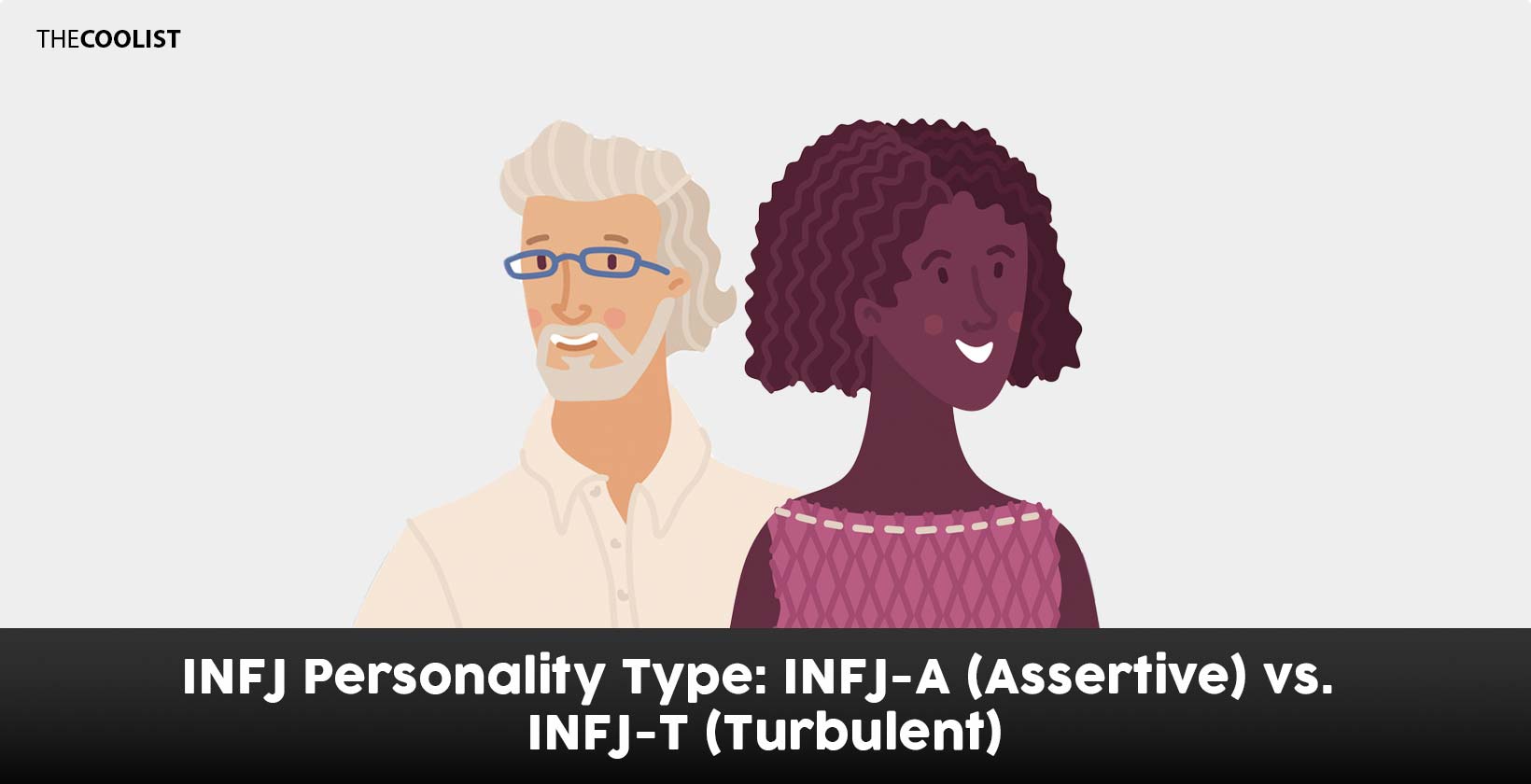View in gallery
The INFJ personality type describes people who are Introverted (I), iNtuitive (N), Feeling (F), and Judging (J). INFJ people, or Advocates, further break down into Assertive (INFJ-A) and Turbulent (INFJ-T) sub-types. Whether an INFJ is Assertive or Turbulent depends on a multitude of factors, such as environment, response to stimuli, and approach to problem-solving.
Assertive INFJ personalities are confident with a level head, while Turbulent INFJ personalities are prone to doubting themselves. Despite their difference in self-confidence, both Assertive and Turbulent INFJs focus on aiding those around them. Advocate personalities account for 1.5% of the population, making them rare compared to other personality types.
What is INFJ-A (Assertive)?
INFJ-A is the Assertive subtype of the INFJ personality type. Assertive INFJs, or INFJ-As, are self-assured and relaxed, choosing to coast through life without concerning themselves with other people’s views. All INFJs are introverts and gain energy from internal feelings, but Assertive personalities are more outgoing and confident.
What is INFJ-T (Turbulent)?
INFJ-T is the Turbulent subtype of the INFJ personality type. Turbulent INFJs, or INFJ-Ts, are passionate and empathetic, showing concern for minute details and minor problems. Each INFJ sub-type experiences self-deprecation, but Turbulent personalities are excessive in their self-criticism.
What are the characteristics of INFJ-A (Assertive)?
There are three main characteristics of INFJ-A types. Firstly, INFJ-As are decisive because they trust themselves and remain calm while making decisions. Secondly, INFJ-As are optimistic and remain positive in the face of uncertainty. Thirdly, INFJ-As are unrepentant and do not feel regret when they experience failure.
What are the characteristics of INFJ-T (Turbulent)?
There are three main characteristics of INFJ-T. Firstly, INFJ-Ts are emotionally reactive and empathetic to others’ emotions. Secondly, INFJ-Ts are idealistic and want to improve themselves and the world around them. Thirdly, INFJ-Ts are regretful and dwell on their mistakes.
How do INFJ-A (Assertive) and INFJ-T (Turbulent) behave in a relationship?
In a relationship, INFJ-A (Assertive) and INFJ-T (Turbulent) types behave as nurturers and counselors for their partners or friends. Although both INFJ sub-types are in tune with others’ feelings, they assert their own emotions at a slower pace. However, INFJ sub-types behave differently in relationships if they encounter hardships. INFJ-As are secure in themselves and will take relationship troubles with a positive outlook. However, INFJ-Ts are more insecure and will elaborate on negativity.
How do INFJ-A (Assertive) and INFJ-T (Turbulent) behave in parenting?
In parenting, INFJ-A (Assertive) and INFJ-T (Turbulent) behave with innate compassion towards their children. Although they desire time alone to recharge, both Assertive and Turbulent INFJs remain supportive of their children and will give up their personal time to benefit them.
INFJ-A and INFJ-T behave differently as parents because of how each type handles failure. All INFJ parents will tend to questions their abilities due to their desire to please others. However, INFJ-Ts will exacerbate any sense of failure and, in turn, become reactive and project this pressure onto their child. An INFJ-A will look towards the future and make efforts to be a better parent as time passes, having a more carefree attitude.
What are the statistics of INFJ-A (Assertive) and INFJ-T (Turbulent)?
There are no conclusive statistics of INFJ-A (Assertive) and INFJ-T (Turbulent) subtypes. However, with knowledge of INFJs’ core characteristics of concern for their fellow humans, idealism, and regard for the opinions of others, Turbulent INFJs prevail among Counselors.
What are the differences between INFJ-A (Assertive) and INFJ-T (Turbulent)?
There are three main differences between INFJ-A (Assertive) and INFJ-T (Turbulent) subtypes. Firstly, INFJ-As and INFJ-Ts handle conflicts differently. INFJ-As will speak up for themselves, while INFJ-T will close themselves off. Secondly, INFJ-As and INFJ-Ts differ in their desire for autonomy. INFJ-A are highly individualistic, but their optimism helps them maintain a healthy social life. On the other hand, INFJ-Ts seek out meaningful relationships but retreat to independence to avoid negative emotions. Thirdly, INFJ-A and INFJ-T have different levels of motivation. INFJ-As remain nonchalant about goals, while INFJ-Ts are success-driven because it impacts the outward perception of INFJ-T.
What are the similarities between INFJ-A (Assertive) and INFJ-T (Turbulent)?
There are three main similarities between INFJ-A (Assertive) and INFJ-T (Turbulent) subtypes. Firstly, INFJ-A and INFJ-T are both altruistic subtypes. Whether Assertive or Turbulent, INFJs’ desire to fight injustice remains one of the main traits of both sub-types. Secondly, INFJ-As and INFJ-Ts are introverts and gain energy from internal sources. Thirdly, INFJ-As and INFJ-Ts both see the best in people around them. Both Assertive and Turbulent INFJs put their friends and partners on pedestals, subsequently pressuring themselves to treat those close to them satisfactorily.
Are INFJ-Ts (Turbulent) prone to stress?
Yes, INFJ-Ts (Turbulent) are prone to stress. Turbulent INFJs’ tendency to become stressed stems from their sensitive nature. All INFJs experience a high level of intuition, and turbulence naturally arises from their perfectionism and sensitivities. However, INFJ-Ts’ level of turbulence is significant and results in profound stress, while INFJ-A know how to remain more tranquil.
